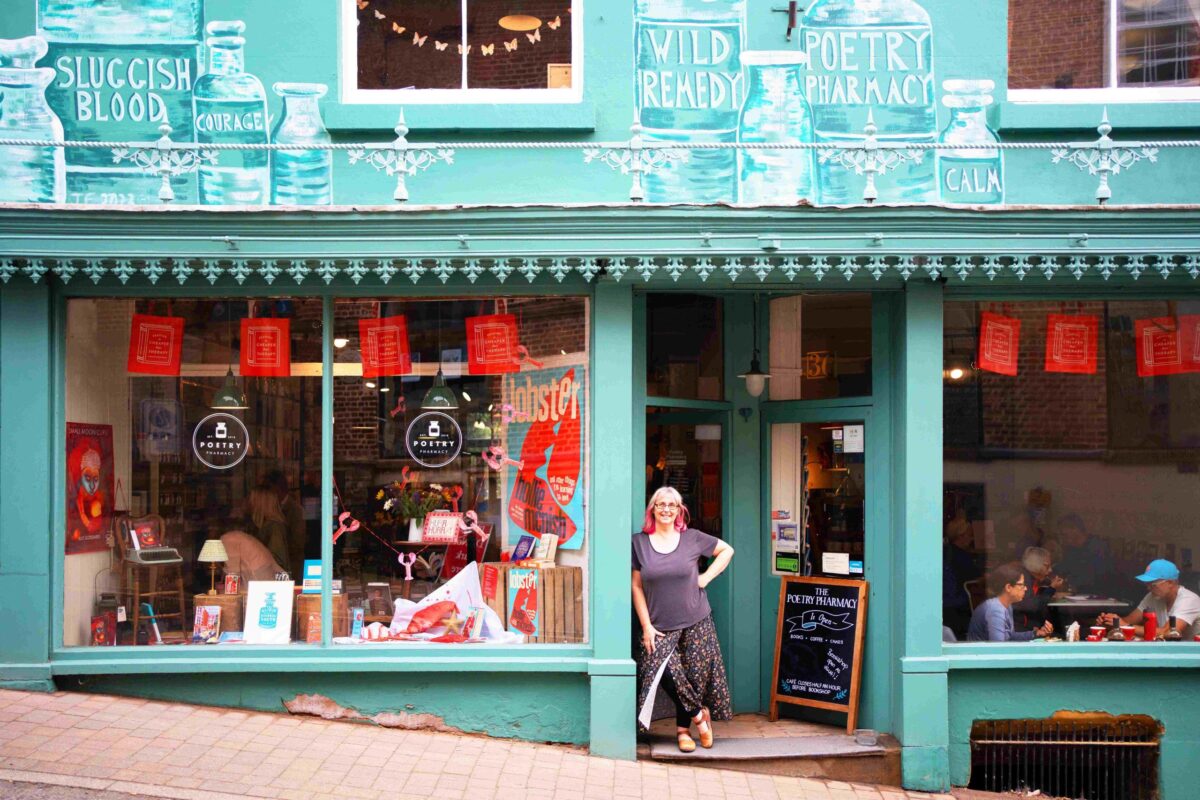Fresh from opening a London branch of the Poetry Pharmacy, peddling literary first aid to a new generation from the most famous shopping street in the world, founder Deb Alma explains why poetry is in motion
What’s the cure for a broken heart? What about for grief, anxiety or loneliness? For those visiting the Poetry Pharmacy – customers or patients, depending how you see them – it’s these questions that are on their minds. The company’s new London bookshop, on Oxford Street, offers tonics to those sorts of emotional ailments. Calm, comfort, inspiration: whatever you’re searching for, there’s a book of poetry, philosophy or psychology to help you find it.
From the metaphysical poets to the romantics, poetry has long had the ability to speak to parts of our soul. When prose fails, often only verse has the answer, says Poetry Pharmacy founder Deb Alma. “At weddings and funerals, it’s a poem that’s read,” she points out. “It’s the art that people in states of heightened emotion turn to.”
Under the UK educational system, poetry is treated as something to be carefully dissected rather than enjoyed, often pushing teenagers to become either angsty teenage poets themselves or full-on haters of the stuff. But over the last decade, this has changed rapidly. Thanks to the birth of so-called ‘instapoetry’, popularised by Rupi Kaur and her bestselling 2014 collection milk & honey, young people are reading poetry again.
Writers like Hollie McNish and Mercury prize nominee Kae Tempest have become rock stars of the genre. Even singer Lana Del Rey has released her own collection. Last year – thanks to the continued success of instapoetry and a revolutionary new translation of Homer – marked the highest sales of poetry since accurate records began.
With its expansive library of brightly coloured books, the Poetry Pharmacy is every poetry fan’s dream. Alma knows that lyrical writing alone won’t cure anyone of life’s greatest traumas. Instead, the London branch – situated above Lush’s heavily scented flagship store – serves as a pastiche of the idea that words cure all. The centrepiece is a rich mahogany cabinet containing small glass bottles labelled with various emotions: ‘love’, ‘invigoration’, a rainbow-coloured ‘pride’. Some are more tongue-in-cheek. There are pills for ‘dithering’ and ‘existential angst’, while a glass flask sat atop reads: ‘Serenity: Keep out of reach of children.’
It’s aesthetically pleasing quirks like these that have made London’s Poetry Pharmacy store a huge hit on social media. In the two months since opening, the place has been near-constantly buzzing, with customers dropping in to buy gifts, sitting with a coffee from the ‘dispensary’ to read and ruminate, and many documenting the whole thing for social media.
Alma, the brainchild behind the operation, couldn’t be happier about it. She speaks to me over Zoom from a room backstage at the much smaller original store in Bishop’s Castle, Shropshire, from where she still orders all the stock for both outlets. The last few months have been pretty “overwhelming”, she admits.

The original Poetry Pharmacy, in a former Victorian ironmonger’s in Bishop’s Castle, Shropshire
Not that you’d tell it from Alma’s ebullience – and it’s not just her pink hair. She’s softly spoken and always smiling, even when furrowing her brow in deep consideration at my questions. Getting people who wouldn’t normally read poetry to encounter it at the pharmacy is one of the most rewarding parts of her job, she explains. “I see our poetry as a gateway drug,” she says, then groans at her own joke. “Sorry, I’m full of terrible puns.”
Alma is passionate about poetry but came to the medium a little later in the game. Life took her in other directions before she began studying for an MA in creative writing while in her late 40s and adopted the medium as a matter of “necessity”. As a mother to young children, poetry was something she could start and finish in the flashes of time she had to herself. She’d always turn to reading it in moments of turmoil though. “There’s something that poetry does that no other art can quite do,” she theorises. “It goes very quickly to the heart of something … as though speaking intimately from one person to another, very, very directly.”
Graduated and freshly out of what she calls a “horrible relationship”, Alma bought a 1950s ambulance on Facebook Marketplace and began driving across the country offering ‘poetry on prescription’ as the Emergency Poet. Her approach was simple and structured. She’d ask her patients about their reading habits, their favourite places and ways they liked to relax. When asking if there was anything they were particularly looking for in poetry, it was as a gentle question, rather than a therapeutic probing.
At weddings and funerals, it’s a poem that’s read. It’s the art that people in states of heightened emotion turn to
Then, she would ‘prescribe’ a poem. Naturally, things could get emotional. The same issues would come up time and time again: loved ones’ cancer diagnoses, workplace stresses, bullying. “People might cry a little bit when they read their poem or when I explained why I’d chosen it,” she says. “It does touch people in a really positive way and meaningful way.” But again, this was not real therapy: “I’m not giving advice. I’m giving them a gift of some carefully chosen words.”
Did she have any favourites she still likes to go back to? She ponders. “There are a few back-up ones. It’s a bit like poem-cetamol.” Alma laughs, as a pun threatens to break through again: “Paracetamol! I need to stop doing that.” She offers up two poems about the power of pausing: Seamus Heaney’s Postscript, and US poet Tony Hoagland’s The Word. She casually recites some lines of the latter: “Down near the bottom of the crossed-out list of things you have to do today, between ‘green thread’ and ‘broccoli’ you find that you have pencilled ‘sunlight’.”
I can see why these words, about taking a moment to breathe, would inhabit new meaning amid Oxford Street’s hectic hustle. Compared to the small shop Alma initially opened in an old Shropshire ironmonger five years ago, it feels like worlds away, and opening a second outlet in London was a huge risk. In those first couple of weeks, when footfall was low and they were losing money, Alma feared she’d made a mistake. But nobody could deny that the Poetry Pharmacy was a canny concept. All it took was for one prominent Instagram page to pick it up, and its popularity boomed.
While the bookshop has a growing presence on TikTok, it’s Instagram – specifically Instagram Stories and Reels – where it’s really popped. For a decade, the platform has solidified its status as online home of poetry. Instapoetry, where work is short and often accompanied by line-drawing illustrations with a focus on self-reflection and self-help, has become a genre in itself.
Naturally, snobbery has followed, from academics and critics who argue that instapoetry lacks the finesse of the more, quote-unquote, highbrow stuff. milk & honey, Canadian poet Kaur’s first collection, has sat in the top five of the year-end poetry chart every year since it was released. Its commercial success can’t be denied, yet the book’s 10-year anniversary this summer prompted that criticism to re-emerge, with one piece describing how the collection “changed poetry for the worse” by turning the medium into “content”.
Poetry goes very quickly to the heart of something … as though speaking intimately from one person to another, very, very directly
Dr J T Welsch, a lecturer at the University of York, initially felt the same reticence to accept the work of Kaur and other instapoets, especially after hearing his academic peers declare it was “not good for poetry”. “I had to not have a kneejerk sense of: ‘Well, that’s not serious. That’s not part of the canon,’” he recalls. Having spent much of her career in publishing, Alma knows a thing or two about gatekeepers and prejudice too. There’s a lot of snobbery, she says, “around what’s considered good poetry; if it’s accessible or not, and if it’s accessible, it can’t be good.”
But the fact is, social media has made poetry popular again. Welsch now includes instapoetry in his classes, and says it’s just as worthy of academic analysis as the classics. He’s hesitant to say that the internet has “democratised” poetry, but it’s certainly widened the idea of what it is. When poems go viral, Welsch says, it shows that the art form is being “demystified, it’s less elitist; it’s more just part of people’s everyday lives.”
For Alma, improving access to poetry is “my reason for all of it, really”. In Shropshire, poetry fans seek the store out, making a poetry pilgrimage of sorts. In the capital, people rarely blindly stumble upon the shop, but aren’t necessarily hardcore readers either. They’re usually an intrigued clientele that’s far more diverse than those visiting her original shop. “I’m trying to get people who don’t normally read poetry to encounter it,” Alma says.
I ask why she thinks so many young people interested in poetry again. She points to secularity, suggesting: “In the absence of religious faith, we are all searching for meaning, for deeper connections with each other.” The Poetry Pharmacy, whether in London or Shropshire, that closeness in their lives, the poems, like the pharmacy, provide “even in a small way, a little community”.
Both Poetry Pharmacies are bookshops with a difference, feeding a cultural hunger for poetry while maintaining Alma’s passion for the healing powers of words. For now, her poetry on prescription service as the Emergency Poet has been put on hold – between running one store, launching another, and editing two poetry books, she simply doesn’t have the time.
One day, she hopes to train up some people in the capital to do it. But for now, Alma thinks of the London shop as embodying its ideas on a larger scale: “The Boots you get at the airport, rather than a little consulting room in the chemist,” she says, with a laugh, before a smiling goodbye and returning to her work, busy as ever.
Photography in Bishop’s Castle: Jonny Keeley
Be part of the solution
Positive News is helping more people than ever to get a balanced and uplifting view of the world. While doom and gloom dominates other news outlets, our solutions journalism exists to support your wellbeing and empower you to make a difference towards a better future.
But our reporting has a cost and, as an independent, not-for-profit media organisation, we rely on the financial backing of our readers. If you value what we do and can afford to, please get behind our team with a regular or one-off contribution.
Give once from just £1, or join 1,400+ others who contribute an average of £3 or more per month. You’ll be directly funding the production and sharing of our stories – helping our solutions journalism to benefit many more people.
Join our community today, and together, we’ll change the news for good.



